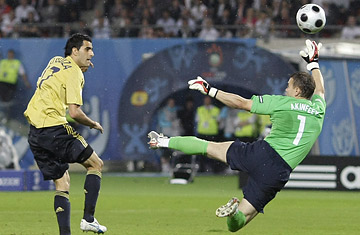
Spain's Daniel Güiza scores during their 3-0 win over Russia.
You can't say that Spain and Germany made compelling cases for their appearances this Sunday in the Euro 2008 finals. You just have to give them credit for overcoming the obstacles that stood in their way. For Germany, a 3-2 winner over an undermanned, overachieving Turkish side, the road to the final has been studded with mediocrity. "There's no consistency in this tournament but we've reached the final," admitted German coach Joachim Löw. The Mannschaft starting brightly in beating Poland, looked dreadful in losing to Croatia, barely adequate in dismissing co-host Austria and strategically sound in mauling the more skillful Portugal in the quarters. But nothing in this team strikes fear into the hearts of its opponents, other than the fact that it's Germany. Which is often enough.
On the other hand, the prospect of facing Spain in a final isn't something that most teams have to think about, given Spain's tendency to fold like a bad poker hand in the quarters of major tournaments. But Spain looked devastating in trashing Russia 4-1 in its opener; less so against Sweden in winning the second game. Its second squad squashed a disinterested Greece in the third game of the first round. Then, in a monumentally awful game with Italy, Spain unloaded 80 years of futility against the Italians by outlasting them on penalties. The flowing attacks of David Villa and Fernando Torres, the nearly choreographed ball possession of Inesta and Xavi Hernandez were missing. But Spain no longer carried history on its back like a refrigerator.
The hope for the semi on Thursday was that Spain and Russia would stage a drag race up and down the pitch in Vienna. Russia had run roughshod over Holland — the odds-on favorite and tournament glamour boys — in the quarters, pouring into the Dutch end like the relentless rains that seemed to show up at every kickoff of Euro 2008. We learned to pronounce the names of strikers Roman Pavlyuchenko and Andre Arshavin (I'm still working on Diniyar Bilyaletdinov). The Russians had gotten progressively better, and their swarming attacks, their pure athleticism, were too much for Sweden and Greece. Plus, the Russians had two pure finishers who had their increasingly proud, loud supporters thinking about the trophy.
What happened to that Russian team? Instead, the semifinal was a cat and mouse game, at least for the first half, with neither team holding much of an advantage or showing much initiative in going forward. Then, five minutes into the second half, Xavi speared a goal for Spain, redirecting Iniesta's cross/shot past Igor Akinfeev. You could sense the panic on the Russian side. The roles were now very clear: Russia was the mouse and Spain was toying with it. Russian coach Guus Hiddink knew that his team's lack of depth and a big-game resume was a vulnerability: "Big teams know how to use their experience, and the longer a game goes on they know they have better qualities. It was new for Korea [the team he coached in 2002] and it's new for Russia. If you can keep the score at 0-0 then it's OK but when you go 1-0 down, if you don't get an equalizer within ten or 15 minutes you have to open up, which makes it difficult to catch an experienced team." The end would come in the 73rd minute when substitute Daniel Güiza latched on to a give-and go pass and lobbed one past Akinfeev. Then in the 82nd minute Cesc Fàbregas broke down the left wing and found David Silva for the finishing blow.